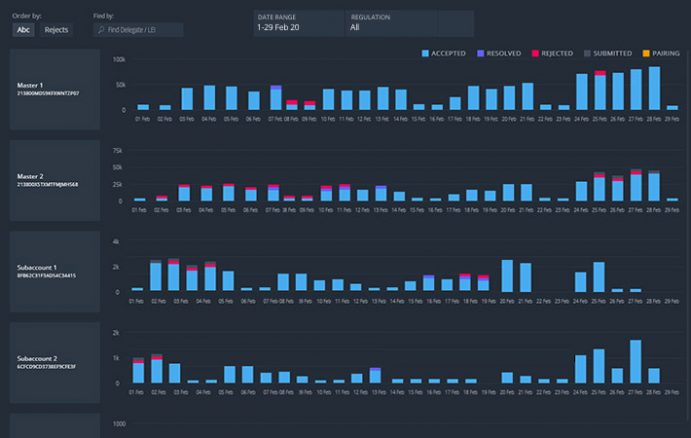
Preparing for EMIR REFIT Next Month – Reporting for NFC-’s
Starting June 18th, 2020, new reporting requirements covering Financial (FC) and Non-Financial Counterparties (NFC) go into effect under EMIR REFIT. The REFIT was enacted on May 2019, with multiple stages of updated requirements for EMIR reporting.
What’s new in June? Required reporting for NFC-
Caught under EMIR when it went live in 2014 are reporting requirements of derivative trades for both EU FC’s and NFC’s. However, certain leniencies were allowed for NFCs with limited derivative exposure. Included was a waiving of daily mark to market valuations.
To distinguish between small and large NFCs, ESMA initiated a clearing threshold calculation (see threshold table below). Firms above the threshold are designated as NFC+ while those below are NFC-.
While EMIR allows for delegated reporting of which companies can report on behalf of their counterparties, the REFIT now creates a requirement of FCs to report on behalf of NFC- counterparties. However, trades between two NFC’s still require both counterparties to report their side of the trade regardless if one side is a NFC+ and the other a NFC-.
As such, from June 18th, FC firms are OBLIGATED to submit EMIR reports for NFC-’s in cases where they are a counterparty to their derivative trades. In practical examples, these trades will most likely be cases where the NFC- is a client of the FC.
Clearing Threshold Table (figures in gross notional value)
- OTC Credit derivative contracts – €1 billion
- OTC Equity derivative contracts – €1 billion
- OTC Interest rate derivative contracts – €3 billion
- OTC Foreign exchange derivative contracts – €3 billion
- OTC Commodity derivative contracts and others – €3 billion
Who is responsible for notifying the FC and clearing threshold calculations?
The ultimate responsibility of reporting falls on the NFC to calculate whether they are under or over the clearing threshold. In addition, an NFC is required to provide relevant trade and corporate details that the FC needs to submit the EMIR report on their behalf.
NFC’s are required to calculate versus the threshold every 12 months.
Who is liable for incorrect and late reports?
As part of their responsibility to report, FCs also become legally liable for the correctness of the report.
Can an NFC- continue to report on their own?
Yes, an NFC- may elect to self report. In this case, once they notify the FC of their intentions, the legal liability for the report returns to the NFC-.
How should sell-side firms prepare?
To prepare for this change, sell side firms may want to review client lists to ascertain which customers fall under the NFC- designation. FC’s should have a system in place to accommodate clients requiring reporting on their behalf (More on Cappitech’s delegated reporting solution).
Is it over-reporting to submit daily valuations for NFC- firms?
As mentioned above, NFC- firms have an exemption of reporting daily valuation updates of their open positions. As per guidance provided from ESMA to Cappitech, when reporting on behalf of a NFC-, a FC may report daily valuation updates similar to how they submit reports for their side of the position and there is no problem of it being considered to be over-reporting.
Looking for an easy-to-use, global reporting platform? Cappitech has the answer.






